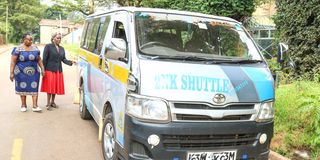Nyeri’s bold women driving on the road less travelled

Members of 2NK United Women Group Grace Ndumia (left) and Elizabeth Kariuki inspect one of their member’s matatu in Nyeri last week.
What you need to know:
- Hellen Nyambura and her colleagues were all matatu owners in the prestigious 2NK Matatu Sacco.
- They faced a myriad of challenges making them realise the need to support each other, outside the big Sacco.
- That is how the 2NK United Women Welfare Group was born.
The matatu industry has been male dominated for years. Very few women have ventured in the trade as drivers, conductors or even matatu owners.
To challenge the status quo, at least 30 women from Nyeri County decided to come together some 16 years ago, to navigate the industry.
At the time, Hellen Nyambura and her colleagues were all matatu owners in the prestigious 2NK Matatu Sacco. The women faced a myriad of challenges making them realise the need to support each other, outside the big Sacco.
That is how the 2NK United Women Welfare Group was born.
At the outset, the women visited each other whenever one of them was experiencing a difficult phase in life like sickness or death in the family. They would contribute some money to support the affected family. Their bond grew so strong and they agreed to start pooling resources on a monthly basis as a revolving fund.
“Initially, the members only supported each other financially, emotionally and morally. Our chama is a forum for us to be there for each other,” Ms Nyambura, the chairlady says.
Best mechanics
Here, the women poured out their matatu-related problems and assisted each other by giving referrals of best mechanics and drivers.
With time, their savings grew and they could get loans for personal use.
“Currently, we are 17 members who stand on the love and trust we have for one another; others have left due to natural causes (death) or left the industry altogether,” she says.
Interestingly, all the 17 are the original members. They have not welcomed new members since its inception because of the high stakes involved in joining as well as the bond they have developed for each other over time.
“We have known each other since 2005. It took time to understand one another. We are part of each other’s lives and have been through a lot together and so it becomes difficult for new members to join and fit in,” adds Ms Nyambura.
“One time we took in new members and some were unable to physically attend meetings, others couldn’t repay their loans and when that happens, we have to let you go, sadly. We decided to remain as the initial members only,” she says.
The 17 all come from different professional backgrounds that include nurses, teachers, police officers, university professors and businesswomen.
They, however, maintain that they set aside their professions and speak as Matatu owners when they meet.
Strict rules
“We do not mix business with our personal issues. When we meet, business matters take precedence and we have very strict rules. Despite our different professional backgrounds, when here, we are one,” Ms Elizabeth Kariuki the group secretary says.
Each member’s monthly contribution is determined by the number of shares she has.
“A member with more shares contributes more and earns more returns,” says Ms Grace Ndumia, the treasurer.
The group has also been able to borrow money from the county Women Enterprise Fund (WEF) which they share and invest individually or jointly.
These loans, they say, have enabled them build their homes, invest in shares and property individually and as a group.
Many of them have invested in agriculture after buying cows, goats and chicken.
“When we take up loans like in WEF, we can decide to invest as a group, like when we bought a matatu or divide it and let members invest individually. We then collect the money and repay the loan monthly,” Ms Ndumia adds.
Even though they have faced a number of challenges including unpaid debts and loans (by members who left) the little money from WEF, which has led to some members not benefiting and currently the Covid-19 pandemic, the group has stayed sane because of their sisterhood.
Matatu business
“This group is not just about money; we are friends and we like to meet and when we do, we enjoy ourselves and have fun,” says Ms Jennifer Mathenge, a member.
They maintain that the pandemic has affected them greatly as it has cut their income from the matatu business and made it difficult for some of them to raise their monthly payment or repay loans.
“If it were not for this group, some of us would not have come back to business with Covid-19. This was the real test for the support we give each other; we checked on each other regularly, giving psychosocial support and advice because we could not meet as often as we would have wanted,” Ms Mathenge says.





